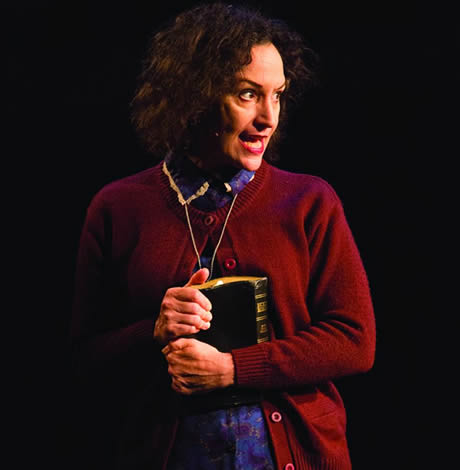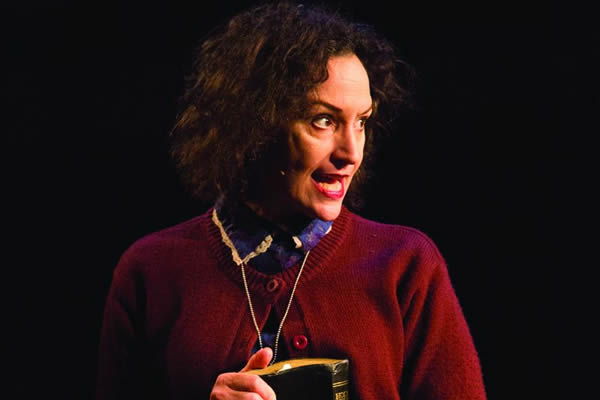Arts & Entertainment
‘Company’ and beyond
‘Carrie’ actress recalls memorable Stritch encounters


Barbara Walsh as Margaret in ‘Carrie: the Musical.’ (Photo courtesy Studio Theatre)
When Barbara Walsh was preparing to play Joanne, the iconic character created by the legendary Elaine Stritch, in the Broadway revival of “Company,” friends were quick to point out that she had large shoes to fill.
“That’s OK,” the actress wryly responded. “I have really large feet.” She also adds, “And they keep getting bigger with age. Bunions are hell.”
Walsh, now onstage as Margaret White in “Carrie the Musical” at Studio Theatre, which runs through Aug. 3 (studiotheatre.org) was shocked when she heard that Stritch died last Thursday.
“It’s a huge loss to the Broadway community,” she says.
When Walsh was in previews for “Company” in 2006, the New Yorker wanted to do a joint interview with the new and old Joanne. As Walsh arrived at the Carlyle (Stritch’s long-time residence in Manhattan), Stritch looked her up and down and declared in her stentorian voice, “Oh, you’re too young to play the part.” Walsh did not mention that she was older than Stritch was when she originated the role.
Stritch, of course, dominated the interview (which was unfortunately never published), but Walsh remembers that the two had a lovely conversation about composer Stephen Sondheim. As Walsh was leaving, Stritch said she was looking forward to seeing the new production, but wouldn’t tell her when she was coming to see the show so she wouldn’t make the younger actress nervous.
As reimagined by British director John Doyle, the Broadway revival of “Company” featured the actors doubling as the orchestra. As the hard-drinking Joanne, Walsh played the triangle and other percussion instruments, most memorably striking a martini glass with a swizzle stick. The cast never left the stage, so Walsh had plenty of time to scan the audience. One night she spotted a woman in an aisle seat in the fifth row dressed in white from head to foot, including, of course, a white hat.
“It was Stritch,” Walsh says. “You couldn’t miss her.”
After the show (“It was a lovely performance”), Walsh was headed from the wig room to her dressing room when she heard a voice booming down the stairwell. “Where’s Barbara?” Stritch bellowed. She descended the staircase and gently grabbed Walsh by the face, quietly saying, “That was just wonderful.”
“It was such a magical moment, a moment I’ll never forget. We just won’t see anyone like her ever again.”
Now Walsh has several pairs of large shows to fill as she tackles the role of Carrie’s murderous mother. There were Piper Laurie and Julianne Moore on the big screen, and Barbara Cook, Betty Buckley and Marin Mazzie in earlier productions of the stage musical. Walsh did not see those other stage performances, but she does remember watching the famous Brian De Palma film for the first time as a teenager.
“I remember being absolutely terrified of Piper Laurie,” she says. “Her performance was simply amazing. Seeing her come down the stairs in her nightgown carrying that knife was delicious. … When you’re playing a role with this rich history, you just have to stay on track and tell the story. It’s an amazing story about a lot of fascinating things.”
For Walsh, the essence of the character is a mother who is terrified of letting her daughter go, rather than religious zealotry or sexual repression, although these elements are also important. The key to the role is deep maternal love.
“That helps me to tell her story in a more grounded way. It was important for me to play the humanity against the madness. I was also very interested in the role reversal between the mother and daughter. It is terrifying to Margaret when Carrie takes over. When Carrie unleashes her telekinetic powers at the end of act one, Margaret is suddenly in uncharted waters. That is very interesting to play.”
One of the most complicated moments for the tangled character is the haunting act two ballad, “When There’s No One.” It illuminates Margaret’s tortured decision to kill her daughter. Walsh says it’s “such a beautiful song, an unbearable life-shifting moment for Margaret that leads to her psychotic break.” She credits the creative team of Michael Gore (music), Dean Pitchford (lyrics) and Lawrence D. Cohen (book) for laying out the moment so well in the script and creating such a multi-layered song.
Despite the excellent writing, Walsh still says the song was a struggle.
“It’s not easy. It’s a very tricky shift and I’m still finding it in some ways.”
Before the song starts, Margaret watches Carrie cross the sage in her home-made prom dress. As Walsh watches Emily Zickler, she says, “a tiny smile that quickly goes away crosses my face. I don’t know if anyone notices, but for me, its Margaret’s last moment of humanity before the madness takes over. The song starts a cappella — that was my decision — because Margaret is super vulnerable in that moment. The song brings together all of Margaret’s conflicting emotions, that she needs to save Carrie’s soul, that she wants to stop her daughter from making the mistakes she made, her anger that Carrie will leave her for someone else, her fear that Carrie will be taunted again and her dread of the horrible loneliness she will feel when Carrie is gone.”
Born in Chevy Chase, the D.C. native calls New York home now, but has returned to the area to star in Studio’s 2008 production of “Grey Gardens” and in “Vanya and Sonia and Masha and Spike” at Center Stage in Baltimore earlier this year. In addition to “Company,” Walsh’s Broadway credits include “Blood Brothers,” “Hairspray,” “Nine” and “Falsettos,” William Finn’s ground-breaking musical about AIDS. Walsh is thrilled to be back at Studio Theatre tackling this incredible role, but is looking forward to returning to her husband (Jack Cummings, artistic director of the Transport Group) and dog in Manhattan.
Out & About
Plan your wedding the LGBTQ way
Washington D.C. LGBTQ+ Wedding Expo scheduled for Sunday

Rainbow Wedding Network will host “Washington D.C. LGBTQ+ Wedding Expo” on Sunday, March 1 at 12:30 p.m.
Guests can meet and mingle with a curated selection of LGBTQ-welcoming wedding professionals from across the region, each ready to help bring your vision to life, and spend a beautiful afternoon exploring everything they need to create a celebration that reflects them.
There will be a relaxed, self-guided look at the Watergate’s spaces and amenities, savor signature cocktails and delicious tasting samples, and connect with other couples who are on the same journey.
Visit Eventbrite to reserve a spot.

Friday, February 27
Center Aging Monthly Luncheon With Yoga and Drag Bingo will be at 12 p.m. at the DC Center for the LGBT Community. Email Mac at [email protected] if you require ASL interpreter assistance, have any dietary restrictions, or questions about this event.
Go Gay DC will host “LGBTQ+ Community Happy Hour Meetup” at 7 p.m. at Freddie’s Beach Bar and Restaurant. This is a chance to relax, make new friends, and enjoy happy hour specials at this classic retro venue. Attendance is free and more details are available on Eventbrite.
Trans Discussion Group will be at 7 p.m. on Zoom. This group is intended to provide an emotionally and physically safe space for trans people and those who may be questioning their gender identity/expression to join together in community and learn from one another. For more details, email [email protected].
Saturday, February 28
Go Gay DC will host “LGBTQ+ Community Brunch” at 11 a.m. at Freddie’s Beach Bar & Restaurant. This fun weekly event brings the DMV area LGBTQ+ community, including allies, together for delicious food and conversation. Attendance is free and more details are available on Eventbrite.
The DC Center for the LGBT Community will host “Sunday Supper on Saturday” at 2 p.m. It’s more than just an event; it’s an opportunity to step away from the busyness of life and invest in something meaningful, and enjoy delicious food, genuine laughter, and conversations that spark connection and inspiration. For more details, visit the Center’s website.
Black Lesbian Support Group will be at 1 p.m. on Zoom. This is a peer-led support group devoted to the joys and challenges of being a Black lesbian. You do not need to be a member of the Beta Kappa Chapter or the Beta Phi Omega Sorority in order to join, but they do ask that you either identify as a lesbian or are questioning that aspect of your identity.Send an email to [email protected] to receive the zoom link.
Sunday, March 1
LGBTQ+ Community Coffee and Conversation will be at 12 p.m. at As You Are. This event is for people looking to make more friends and meaningful connections in the LGBTQ community. Attendance is free and more details are available on Eventbrite.
Monday, March 2
“Center Aging: Monday Coffee Klatch” will be at 10 a.m. on Zoom. This is a social hour for older LGBTQ+ adults. Guests are encouraged to bring a beverage of choice. For more information, contact Adam ([email protected]).
Tuesday, March 3
Universal Pride Meeting will be at 7 p.m. on Zoom. This group seeks to support, educate, empower, and create change for people with disabilities. For more details, email [email protected].
Wednesday, March 4
Job Club will be at 6 p.m. on Zoom upon request. This is a weekly job support program to help job entrants and seekers, including the long-term unemployed, improve self-confidence, motivation, resilience and productivity for effective job searches and networking — allowing participants to move away from being merely “applicants” toward being “candidates.” For more information, email [email protected] or visit www.thedccenter.org/careers.
Center Aging Women’s Social and Discussion Group will be at 6 p.m. on Zoom. This group is a place where older LGBTQ+ women can meet and socialize with one another. There will be discussion, activities, and a chance for guests to share what they want future events to include. For more information, email [email protected].
Thursday, March 5
The DC Center’s Fresh Produce Program will be held all day at the DC Center for the LGBT Community. People will be informed on Wednesday at 5 p.m. if they are picked to receive a produce box. No proof of residency or income is required. For more information, email [email protected] or call 202-682-2245.
Virtual Yoga Class will be at 7 p.m. on Zoom. This free weekly class is a combination of yoga, breathwork and meditation that allows LGBTQ+ community members to continue their healing journey with somatic and mindfulness practices. For more details, visit the DC Center’s website.
a&e features
Transmission DC breathes new life into a storied sound space
A fresh home for boundary-pushing culture on H Street

Late last year, phoenix-style, a fresh home for boundary-pushing culture arose on the H Street corridor. Transmission DC – a queer, trans, and POC-owned, operated, and centered community-focused venue – powered on in the former home to the Rock & Roll Hotel (famously, not a hotel, but very much rock & roll). Transmission (1353 H St., N.E.) arrives secure in its mandate – or even birthright – to provide a place to celebrate creativity and music through a lens of inclusivity and respect.
Transmission’s team brings experience, but also representation. Owners/partners Kabir Khanna (who is also programming director), Katii B, Ellie McDyre, and Kelli Kerrigan together previously managed 618 productions, a venue in Chinatown, crafting “some of D.C.’s freakiest parties, raves, and mosh pits” they note.
They packed up operations last fall to a space curated specifically for D.C.’s underground music and culture scene, building their efforts in Chinatown to bring in more fans in queer and POC circles.
Transmission, Khanna points out, is built on DIY values. In the music scene, DIY means that promoters and organizers – often disconnected from the mainstream and part of marginalized communities – build shows and programs collaboratively, but independently from institutions, supporting each other as smaller, independent venues close. Here, Transmission aims to ensure that those putting together these underground inclusive shows have a more permanent and stable home, can have access to resources, and can provide more sustainable income to artists. “We’re trying to get more people to support and enjoy the music, and also give artists and organizers within the DIY community more structure and a larger cut,” says Khanna.
Khanna also notes that Transmission operates “under the principles of safety, inclusivity, and respect.” McDyre added that even at venues that claim inclusivity, that statement might not take place in practice. We’re “not just pitting up a rainbow flag,” says McDyre, but as some of the owners are trans and POC, audiences can see themselves reflected at the top.
Much like the DIY nature of the music community, the Transmission owners brought a DIY ethos to turning around their space.
In March 2020 – the height of COVID lockdowns – Rock & Roll Hotel suddenly shuttered, though not due to the pandemic; instead, the venue claimed that decreasing sales and increasing competition led to the closure. For 14 years, it was the central spot for cheap beer and lesser-known and celebrated acts. The space stood vacant for more than five years, until Transmission turned the power back on.
“When we got into the space, it was effectively abandoned for years,” says Khanna. “There was a ton of mold, and paint primer covering all surfaces. It was nearly falling apart.” Khanna noted that many music venues like this one, regardless of how well it was maintained, “get the shit kicked out of it,” given the nature of shows. The team called in mold removal contractors, ripped up most of the floorboards, and started fresh.
Transmission’s first floor is styled as a stripped-down black box: the better to take in the music. “It’s minimal on purpose to act as a canvas for set design and music,” without a specific aesthetic, says Khanna. Moving upstairs, the second floor has been opened up, removing some walls, and now has a larger dance area than the first floor. Beyond the first two performance levels, and a holdover from Rock & Roll Hotel, is the rooftop. Though without a stage, the rooftop space is filled with murals splashed across the walls, with a full bar. Transmission’s current capacity is 496, but the team is looking to grow that number. Transmission will also leverage the full kitchen that Rock & Roll Hotel operated, bringing in Third Hand Kitchen to offer a variety of food, including vegan and vegetarian options.
Khanna pointed out an upcoming show reflective of Transmission’s inclusive ethos: Black Techo Matters on Feb. 27. The event is set to be “a dynamic, collaborative night of underground electronic music celebrating Black History Month.” Khanna says that techno came from Black music origins, and this event will celebrate this genesis with a host of artists, including DJ Stingray 313, Carlos Souffront, and Femanyst.




















